Related Research Articles

The Union of South Africa was the historical predecessor to the present-day Republic of South Africa. It came into existence on 31 May 1910 with the unification of the Cape, Natal, Transvaal, and Orange River colonies. It included the territories that were formerly part of the South African Republic and the Orange Free State.

Sir Henry Bartle Edward Frere, 1st Baronet, was a British colonial administrator. He had a successful career in India, rising to become Governor of Bombay (1862–1867). However, as High Commissioner for Southern Africa (1877–1880), he implemented a set of policies which attempted to impose a British confederation on the region and which led to the overthrow of the Cape Colony's first elected government in 1878 and to a string of regional wars, culminating in the invasion of Zululand (1879) and the First Boer War (1880–1881). The British Prime Minister, Gladstone, recalled Frere to London to face charges of misconduct; Whitehall officially censured Frere for acting recklessly.
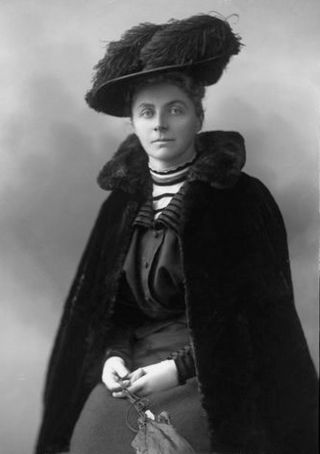
Emily Hobhouse was a British welfare campaigner, anti-war activist, and pacifist. She is primarily remembered for bringing to the attention of the British public, and working to change, the deprived conditions inside the British concentration camps in South Africa built to incarcerate Boer and African civilians during the Second Boer War.

John Xavier Merriman was a South African politician who served as the eleventh Prime Minister of the Cape Colony from 1908 to 1910. He was the last prime minister of the Cape Colony before the formation of the Union of South Africa in 1910.
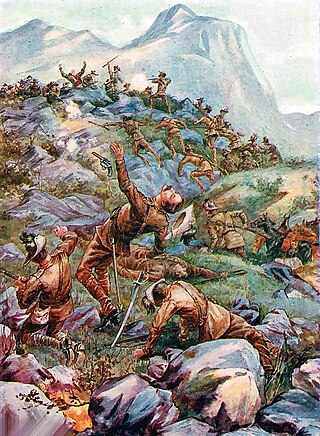
The Battle of Stormberg was a British assault on Stormberg Junction on 10 December 1899. At that time, the Boers had taken control of Molteno and the heights around Stormberg Junction, as part of their invasion of Cape Colony. William Gatacre, the general in command of troops in the Cape Midlands, decided to dislodge the Boers from their position in order to secure the railway lines which supplied the larger March on Kimberley by Lord Methuen. Due to a failed night march and a badly coordinated assault, the Boers repulsed the British army, with the Northumberland Fusiliers suffering high casualties.
The Stop the War Committee was an anti-war organisation that opposed the Second Boer War. It was formed by William Thomas Stead in 1899. Its president was John Clifford and prominent members included Lloyd George and Keir Hardie. The group was generally seen as pro-Boer.
Opposition to the Second Boer War occurred both within and outside of the British Empire. Among the British public, there was initially much support for the war, though it declined considerably as the conflict dragged on. Internationally, condemnation of the British role in the war came from many sources, predominately left-wing and anti-imperialist commentators. Inside Britain, influential anti-war groups, especially those consisting of members of the opposition Liberal Party, quickly formed. They campaigned ineffectually against British wartime policies, which were supported by the Conservative Party of Prime Minister Lord Salisbury.

Sir John Gordon Sprigg, was an English-born colonial administrator and politician who served as prime minister of the Cape Colony on four occasions.

Sir John Charles Molteno was a politician and businessman who served as the first Prime Minister of the Cape Colony from 1872 to 1878.
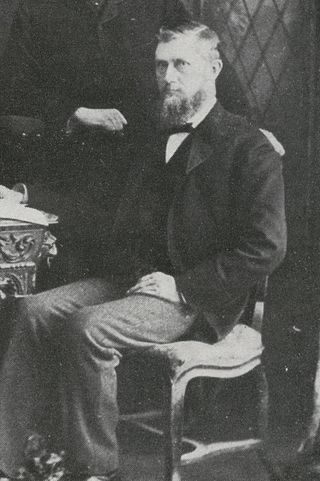
Sir Thomas Charles Scanlen was a politician and administrator of the Cape Colony.

The South African Wars, including but also known as the Confederation Wars, were a series of wars that occurred in the southern portion of the African continent between 1879 and 1915. Ethnic, political, and social tensions between European colonial powers and indigenous Africans led to increasing hostilities, culminating in a series of wars and revolts, which had lasting repercussions on the entire region. A key factor behind the growth of these tensions was the pursuit of commerce and resources, both by countries and individuals, especially following the discoveries of gold in the region in 1862 and diamonds in 1867.

Percy Alport Molteno was an Edinburgh-born South African lawyer, company director, politician and philanthropist who was a British Liberal Member of Parliament (MP) from 1906 to 1918.

Molteno is a town in the Eastern Cape province of South Africa.

Sir James Molteno, was an influential barrister and parliamentarian of South Africa.

Elizabeth Maria Molteno, was an early South African British activist for civil and women's rights in South Africa.
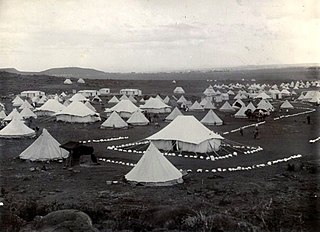
During the Second Anglo-Boer War (1899–1902), the British operated concentration camps in the South African Republic, Orange Free State, Natal, and the Cape Colony. In February 1900, Herbert Kitchener took command of the British forces and implemented some controversial tactics that contributed to a British victory.
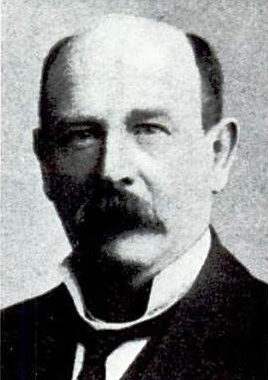
Jacobus Wilhelmus ("J.W.") Sauer, was a prominent liberal politician of the Cape Colony. He served as Minister in multiple Cape governments, and was influential in several unsuccessful attempts to enshrine equal political rights for black South Africans in the constitution of the Union of South Africa. He was also a strong early supporter of women's rights and suffrage.

John Charles Molteno Jr. M.L.A., was a South African exporter and Member of Parliament.

Catherine Courtney, Baroness Courtney of Penwith, known as Kate Courtney, was a British social worker and internationalist. Active in charitable organisations in her early life, she later campaigned with her husband Leonard Courtney to end the Second Boer War and the First World War. She sought to bring attention to the plight of citizens of the enemy nations and was denounced as being overly sympathetic to the enemy during both wars.
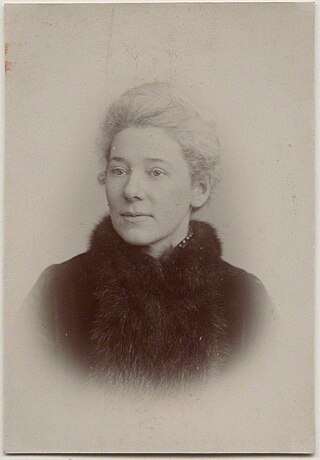
Emma Jane Catherine Cobden was a British Liberal politician who was active in many radical causes. A daughter of the Victorian reformer and statesman Richard Cobden, she was an early proponent of women's rights, and was one of two women elected to the inaugural London County Council in 1889. Her election was controversial; legal challenges to her eligibility hampered and eventually prevented her from serving as a councillor.
References
Notes
- 1 2 "South Africa Conciliation Committee". The Times . 17 January 1900. p. 10.
- 1 2 3 Brown (2003), p. 179.
- ↑ Davey (1978), p. 220.
- ↑ Marthinus van Bart: Songs of the Veld. Cape Town: Cederberg Publishers, 2008. ISBN 978-0-620-39432-1
- 1 2 3 Howe & Morgan (2006), p. 239.
- ↑ John Vickers, John Clifford Archived 2007-12-30 at the Wayback Machine , in A Dictionary of Methodism in Britain and Ireland, online at Spartacus Educational
- ↑ "The Cobdens". Hurley Skidmore History. Retrieved 29 December 2024.
- ↑ "England And Wales". The Times . 27 September 1900. p. 10.
- ↑ Lowry (2000), p. 258.
- ↑ "The Recklessness of the Peace Party". The Spectator. 2 March 1901. Retrieved 21 July 2011– via Google Books.
a body whose special raison d'etre is to supply authentic and truthful information in regard to the war
- ↑ H.H. Hewison: Hedge of Wild Almonds. James Currey Publishers. 1989. p. 102.
Bibliography
- Brown, Heloise (2003). "The truest form of patriotism": pacifist feminism in Britain, 1870–1902. Manchester University Press. ISBN 0-7190-6531-3.
- Davey, Arthur (1978). The British pro-Boers, 1877–1902. Tafelberg. ISBN 0-624-01200-X.
- Howe, Anthony; Morgan, Simon (2006). Rethinking nineteenth-century liberalism: Richard Cobden bicentenary essays. Ashgate. ISBN 0-7546-5572-5.
- Lowry, Donal (2000). The South African War reappraised. Manchester University Press. ISBN 0-7190-5825-2.